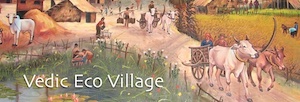OM SRI SURABHYAI NAMAH! OM SRI GURAVE NAMAH!
We all know how the word "sudra" in present day society generates negative and unfavourable remarks and feelings. However, when we understand that human civilization begins when one is part of the varnasrama system, this means that those playing the role of sudras are part of the Aryan civilization and meant to be cared for and respected. In the Srimad-Bhagavatam, Canto 7, Chapter 11, Srila Narada Muni expounds the qualities of a sudra as follows:
çüdrasya sannatiù çaucaà sevä sväminy amäyayä
amantra-yajïo hy asteyaà satyaà go-vipra-rakñaëam
TRANSLATION
Offering obeisances to the higher sections of society [the brähmaëas, kñatriyas and vaiçyas], being always very clean, being free from duplicity, serving one's master, performing sacrifices without uttering mantras, not stealing, always speaking the truth and giving all protection to the cows and brähmaëas—these are the symptoms of the çüdra.
PURPORT
It is everyone's experience that workers or servants are generally accustomed to stealing. A first-class servant is one who does not steal. Here it is recommended that a first-class çüdra must remain very clean, must not steal or speak lies, and must always render service to his master. A çüdra may attend sacrifices and Vedic ritualistic ceremonies along with his master, but he should not utter the mantras, for these may be uttered only by the members of the higher sections of society. Unless one is completely pure and has been raised to the standard of a brähmaëa, kñatriya or vaiçya—in other words, unless one is dvija, twice-born—the chanting of mantras will not be fruitful. [SB 7.11.24]
Traditional technologies and manual skills are generally the domain of sudras. Without qualified sudras in society, communities cannot develop and prosper.
In our Vedic Eco Village, in particular at the Gurukula Colony where the emphasis will be brahminical culture, ksatriya culture and care for cows will be the focus, there will be ample opportunities for devotees to help in various fields of activities, as outlined by Srila Narada Muni.
- Log in to post comments
